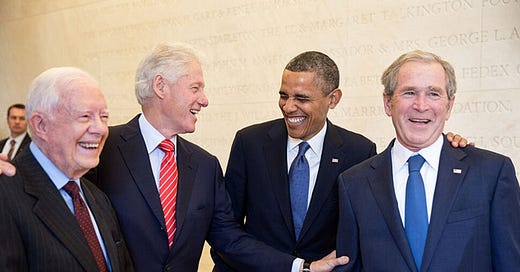Remembering Jimmy Carter's not-so-peaceful foreign policy
Not being as hawkish as modern presidents is a low bar to clear
In his post presidency years, Jimmy Carter had quite the record when it came to being an anti-war voice, especially as a former US president. He warned against invading Iraq in 2003, spoke out against US meddling in Syria, and even condemned Israel's brutal policies in occupied Palestinian territories.
Unfortunately, Carter's opportunity to create the kind of foreign policy he wanted was squandered during his time in office, and many of the policies he spoke out against in retirement are the kinds of policies his administration supported.
For example, in June 1979, President Carter greenlit pre-production of a 190,000 pound missile capable of carrying 10 nuclear warheads. After taking office in 1981, Reagan supported and even expanded the program, dubbing it the "Peacekeeper".
In July, Carter authorized covert aid for opponents of the Communist government in Afghanistan. Reagan's National Security Adviser would later admit that "we didn't push the Russians to intervene, but we knowingly increased the probability that they would." Less than a year later, the Russians invaded, and the US and Saudi Arabia gave an estimated $40 billion in support to mujahideen guerrilla fighters opposing them, an action which substantially impacted world events decades later.
Carter would use the Russian invasion of Afghanistan as an excuse to withdraw from Senate ratification the already-signed SALT II nuclear arms treaty.
The Carter administration also abandoned campaign pledges to cut defense spending by $7 billion, and instead initiated budgetary increases that in his last two years amounted to the largest in history up to that point. Money for research and development and the purchase of new aircraft and army equipment nearly doubled and Pentagon support for research in the universities increased by nearly 70 percent. In a 2017 biography, Edward Keefer wrote that Carter “became a reluctant convert to increased defense spending” and “brought into production new weapons including stealth aircraft, precision bombs and modern digital technology,” which “prepared the foundation for President Reagan and Secretary of Defense Caspar Weinberger’s military buildup and revolution in defense.”
When asked if the United States had a moral obligation to help rebuild Vietnam, Carter responded by claiming “the destruction was mutual.”
“You know, we went to Vietnam without any desire to capture territory or to impose American will on other people. We went there to defend the freedom of the South Vietnamese. And I don’t feel that we ought to apologize or to castigate ourselves or to assume the status of culpability.”
In 1979, a military faction in El Salvador consolidated its power following a coup against the previous military government. The ensuing government killings set off El Salvador’s bloody 12-year civil war. The Carter administration supported the coup regime, believing that it offered the best opportunity to stabilize the country and prevent a communist takeover.
In January 1980, Carter declared in his State of the Union address that any attempt "by any outside force to gain control of the Persian Gulf region will be regarded as an assault on the vital interests of the United States of America, and such an assault will be repelled by any means necessary, including military force." This will come to be known as the Carter Doctrine.
Carter didn't authorize an invasion that killed hundreds of thousands like Bush did in Iraq, start drone wars in seven different countries like Obama, drop America’s largest non-nuclear bomb on Afghanistan like Trump, or fund a genocide in Gaza like Biden. Carter's body count might be smaller, but the graves still nonetheless exist. Carter can be remembered for a lot of things, but being a dove is not one of them.



